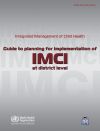Information resources
Early childhood development
Investing in early childhood development is an emerging area of concern in global public health. Evidence has shown that early years of life determine and influence health, well-being, behaviour and cognitive functions of people. Early detection and intervention for children with disabilities significantly improves their chances for lifelong inclusion, well-being and productivity and early childhood years provide an important window of opportunity to build a strong foundation. Unfortunately, not all children are able to reach their full potential, mainly due to nutritional problems and structural factors related to poverty, education and other social determinants of health.
The health system provides an excellent platform for early childhood development interventions. It offers multiple points for interaction during the early years of life which could be good opportunities to foster interventions for early childhood development. In addition, the health system has the potential to universally reach children and their families and already there is an adequate level of trust on health care providers.
WHO in the Eastern Mediterranean Region advocates for scaling up of all the evidence-based, cost-effective interventions of early childhood development within existing child health programmes and platforms. It also calls for integration of early childhood development activities in all strategic plans for reproductive, maternal, newborn, child and adolescent health plans for the post-2015 era. Guidelines on “care for development” have been incorporated in the IMCI guidelines.
Country examples of psychosocial development aspects of child care included in the IMCI guidelines include the guidelines developed in Morocco, Oman, Syrian Arab Republic and Tunisia.
Related link
Advancing Early Childhood Development: from Science to Scale
Integrated Management of Childhood Illness



















